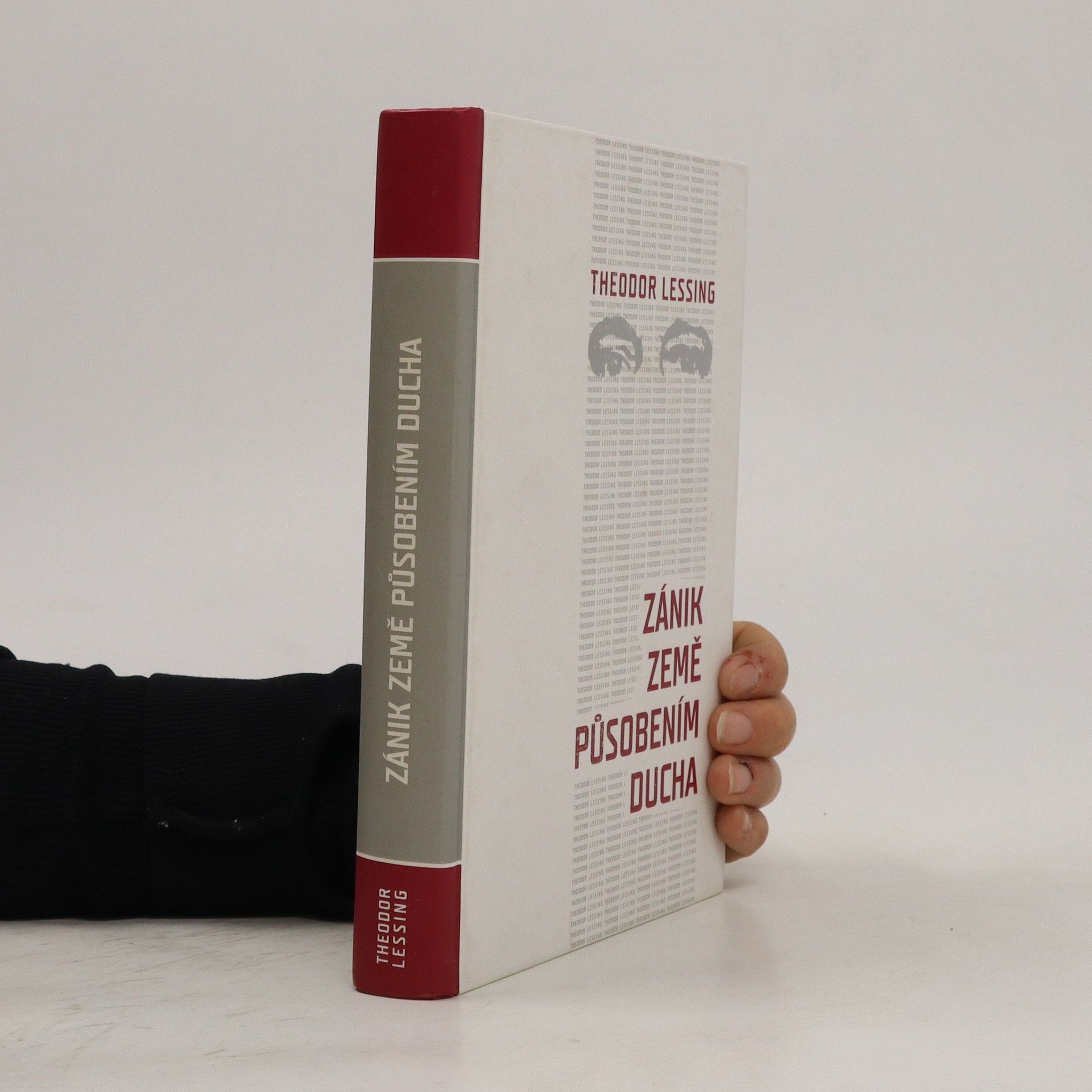In den Jahren 1921 bis 1923 reflektiert Theodor Lessing die gesellschaftlichen und wirtschaftlichen Krisen der Weimarer Republik. Seine Beiträge für das 'Prager Tagblatt' thematisieren die Nachwirkungen des Ersten Weltkriegs, die Hyperinflation und die Besetzung des Ruhrgebiets. Mit satirischem Witz beleuchtet er die Psychologie der Börse und die Philosophie des Schlangestehens, während er auch die Erinnerung an den Krieg wachhält. Lessings Texte sind geprägt von konkreten Beobachtungen und bieten unterhaltsame sowie tiefgründige Einsichten, die auch für die moderne Leserschaft relevant sind.
Theodor Lessing Book order (chronological)
Theodor Lessing was a German philosopher known for his profound exploration of Jewish identity and the phenomenon of antisemitism, which he sought to explain amidst the rise of Nazi Germany. Influenced by Nietzsche, his work delved into the nature of history as a subjective construct and the human search for meaning in an unknowable reality. Lessing's philosophical legacy lies in his critical engagement with the complex social and psychological currents of his time, offering a unique perspective on self-hatred and societal conflict.







Einmal und nie wieder
Lebenserinnerungen
Theodor Lessing (8.2.1872 - 31.8.1933) war ein deutsch-jüdischer Philosoph und politischer Publizist.
In "Der Lärm" kritisiert Theodor Lessing die omnipräsente Geräuschkulisse der modernen Welt und deren Auswirkungen auf das menschliche Leben. Er beleuchtet, wie Lärm nicht nur die Sinne überfordert, sondern auch das Denken und die Kommunikation beeinträchtigt. Lessing plädiert für eine Rückkehr zur Stille und zur bewussten Wahrnehmung der Umwelt. Seine Kampfschrift ist ein leidenschaftlicher Appell, die Lebensqualität durch die Reduzierung von Lärm zu verbessern und die innere Ruhe wiederzufinden.
Kultur und Nerven. Kleine Schriften 1908-1909
- 1018 pages
- 36 hours of reading
Die beiden Bände »Kultur und Nerven« versammeln philosophische und ästhetische Texte von Theodor Lessing, einem bedeutenden deutsch-jüdischen Philosophen der Moderne. Sie enthalten unter anderem Studien zu Theater und Reformpädagogik sowie satirische Beiträge zur deutschen Kultur, die Lessings Streben nach Humor und Freiheit widerspiegeln.
Der Lärm
- 226 pages
- 8 hours of reading
Allgegenwärtiges Brüllen, Dröhnen, Pfeifen, Zischen, Fauchen, Hämmern, Rammeln, Klopfen, Schrillen, Schreien und Toben, vor dem der friedliebende Geist weder in Stadt noch Land mehr Zuflucht findet: In seiner furiosen Polemik gegen den Lärm und für die Höflichkeit versuchte Lessing 1908 die zudringlichen Geräusche mit einer glänzenden Typologie der Angriffsformen auf das Ohr zu bannen. Dabei entstand nicht nur eine hervorragende Bestimmung des Lärm-Phänomens zwischen Selbstbetäubung, Vitalität und Aggression, sondern auch ein berührendes Plädoyer für Feinsinnigkeit und Rücksichtnahme, kurz: Menschenfreundlichkeit. Lessing, der bald einen Anti-Lärm-Verein sowie die Zeitschrift Der Anti-Rüpel gründete, ging gegen die Kräfte des gesamtgesellschaftlichen Getöses und der Rohheit mit allem an, was er hatte, und unterlag ihnen am Ende doch. Heute ist die Beschallung mittels mitgeführter Lautsprecher auch im Freien universell geworden, wie in Identifikation mit dem Aggressor leitet sie sich gar jeder per Kopfhörer direkt in den Gehörgang. Angesichts dessen wird hier Lessings Kampfschrift, begleitet von kommentierenden Essays, für das tägliche Abwehrgefecht gegen den Lärm als Einzelausgabe zugänglich gemacht: einer der schönsten, stillen Hilferufe der deutschsprachigen Literatur.
Die Haarmann-Prozesse
3 zeitgenössische Publikationen sowie verstreute Artikel Theodor Lessings zu den Gerichtsverfahren gegen Fritz Haarmann und Hans Grans 1924–1926
3 zeitgenössische Publikationen mit 22 Fotos, sowie verstreute Artikel Theodor Lessings zu den Gerichtsverfahren gegen Fritz Haarmann und Hans Grans, 1924-1926.
Theodor Lessings Werk über Nietzsche, erschienen 1925, umfasst Themen wie die Jugend, die Philosophie des Vormittags, den Übermenschen und die ewige Wiederkehr. Diese Neuausgabe von 2023, herausgegeben von Karl-Maria Guth, berücksichtigt die neue deutsche Rechtschreibung. Lessing war ein umstrittener Schriftsteller und Opfer des Nationalsozialismus.
Hluk : proti hlučnosti našeho života
- 128 pages
- 5 hours of reading
Studie o hluku německého filosofa Theodora Lessinga ukazuje, že se jeho kritický pohled na prožívanou skutečnost netýkal pouze obecnějších okolností, ale že byl prodchnut zájmem o kvalitu života. Jak Lessing podotýká v úvodu své knihy „zabývat se Bohem a koncem lidstva není o sobě a pro sebe významnější než zabývat se tisícem konkrétních praktických maličkostí“. Jsou to totiž právě tyto zdánlivé maličkosti, které nejzásadněji ovlivňují naše všední starosti a problémy. Autor se snaží z různých hledisek objasnit škodlivost nadbytečného hluku civilizovaného života. Činí tak v pěti na sebe navazujících kapitolách, v nichž se zabývá například psychologií ohlušování, vztahem mezi kulturou a hlukem či citlivostí ucha. Protože je přesvědčen, že svým dílem, které vyšlo před více než sto lety, může napomoci účinnému zlepšování celkových podmínek života, přidává v poslední části návrhy na to, jak se protihluková opatření mohou stát součástí právních norem. Jakkoliv se Lessing mimo jiné odvolává i na Schopenhauerovo až příliš jednostranné odsouzení hlučných projevů, ve svých vlastních detailních analýzách se vedle otázky škodlivosti nadměrného hluku snaží pochopit hlubší psychologické důvody toho, proč se lidé takového hluku dopouštějí. Ve svém uvažování se pohybuje na úrovni dosavadního poznání rozličných vědních oborů, aby podal pokud možno co nejkomplexnější pohled na probíranou problematiku.
Zánik Země působením ducha
- 292 pages
- 11 hours of reading
Filozofické dílo Theodora Lessiga. Theodor Lessig (1872-1933). Německý filosof, publicista a literát židovského původu, ovlivněný Ludwigem Klagesem, Theodorem Lippsem a zvláště kulturním kriticismem Friedricha Nietzscheho. Představitel filosofie života, ostrý kritik německého nacionálního socialismu. Narodil se v Hannoveru. V emigraci patřil k výrazným politickým a ideovým odpůrcům fašismu. Vlastní filosofii označoval jako tzv. "aktivismus" (filosofii činu). Odmítal existenci zákonitostí v lidském jednání, obracel se proti technické civilizaci a mýtu její racionálnosti. Filosofie a historie je podle něho vkládání smyslu do nesmyslného. Zastával radikálně skeptický a pesimistický názor na svět. Jeho zavraždění nacisty v Mariánských Lázních vzbudilo velký mezinárodní ohlas.



